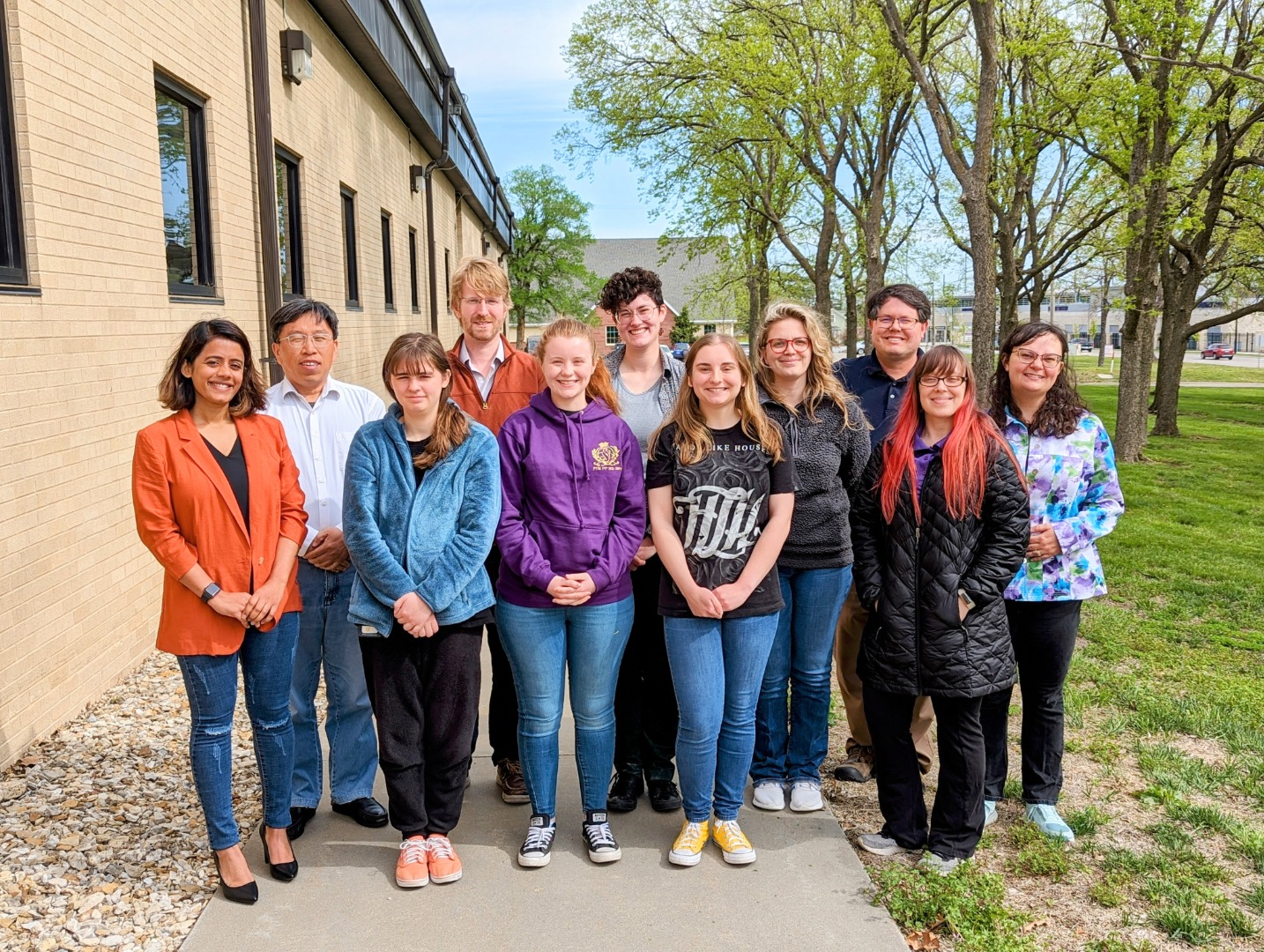
Caption: Morrison Lab Circa April 2024 in Manhattan, KS.
About the Morrison Lab
We are a group of researchers investigating the behavioral and chemical ecology of insects after harvest. After harvest, producers lose 10-30% of their commodities to damage by post-harvest insects through the storage, transportation, processing, and marketing of products before they reach the hands of consumers. The post-harvest commodity chain represents hundreds of billions of US dollars in value (think of everything from on-farm storage of bulk commodities to finished products in retail stores). We are focused on developing economical and sustainable tactics for diversifying management of stored product insects that will provide safe and healthy products. Our research explores how we can develop robust integrated pest management programs from farm to fork by exploiting insect behavior and chemical ecology.
If you are interested in working in the Morrison Lab, please contact the head of the lab (Dr. Rob Morrison) by sending an email with your research interests and current CV to william.morrison “at” usda [.] gov.
Lab Members
Dr. Rob Morrison (SY)
Jennifer Abshire (Permanent Tech)
Avery James (Biological Sciences Aide)
Dante Castaldi (Biological Sciences Aide)
Kealani Simpson (Biological Sciences Aide)
Jenna Moreland (Biological Sciences Aide)
Hazel Scribner (M.S. Student)
Jacqueline M. Maille (Ph.D. Student)
Sabita Ranabhat (Ph.D. Student)
Jacqueline Duran (Ph.D. Student)
Dr. Hannah E. Quellhorst (Postdoc)
Dr. Rachel R. Harman (Postdoc)
Dr. Matt Hetherington (Postdoc)
Dr. Mia Phillips (Postdoc)
Dr. Qinglei Ming (Postdoc)
Recent Selected Awards to Lab
2024
Sabita Ranabhat won the K-State Research and Extension Director’s Award for Outstanding Graduate Research by a PhD Student ($500) from the College of Agriculture at Kansas State University.
Hazel Scribner won the Graduate Dean’s Award for Excellence, Engagement, and Leadership ($1,000) from Graduate School at Kansas State University.
Dante Castaldi won 2nd Place in the B.S. Poster Competition at the North-Central Branch Meeting of the Entomological Society of America Meeting, Ft. Collins, CO.
Sabita Ranabhat won the Graduate Student Scholarship at the North-Central Branch Meeting of the Entomological Society of America Meeting, Ft. Collins, CO.
Hazel Scribner was a finalist in the university-wide 3MT competition at Kansas State University, Manhattan, KS.
2023
Sabita Ranabhat won 1st Place for the President’s Prize in the Graduate Student Poster Competition at the 71st Annual Meeting of the Entomological Society of America, National Harbor, MD.
Sabita Ranabhat won 2nd Place in the Graduate Student Poster Competition competing among 40 students from 30 institutions and several countries at the Borlaug Dialogue hosted by the World Food Prize Foundation in Des Moines, IA.
Hazel Scribner and Sabita Ranabhat were on the Kansas State University team that won runner-up in the Wilbur-Ellis Food Innovation 2023 Award.
Sabita Ranabhat won the University Distinguished Professor’s (UDP) Graduate Student Award from Kansas State University, one of the highest honors.
Dr. Rob Morrison won the Early Career Award from the International Society of Chemical Ecology at the Annual Meeting in Bangalore, India.
Dr. Hannah Quellhorst won the CGS/Proquest Dissertation Award of Excellence in the Biological Sciences category at Kansas State University.
Dr. Hannah Quellhorst won the J.H. Comstock Award from the North-Central Branch of the Entomological Society of America.
Sabita Ranabhat won 1st Place in the Combined Ph.D. Student Poster Competition at the Joint Annual Meeting of the North-Central Branch and Southwest Branch of the Entomological Society of America.
Jacqueline Maille won 1st Place in the Ph.D. Student Competition at the Kansas Entomological Society Meeting.
Dr. Hannah Quellhorst won the K-State Research and Extension Director’s Graduate Student Award for Outstanding Research at Kanas State University.
Ongoing Research Projects
Below is just a sampling of some of the ongoing current projects in the Morrison Lab.
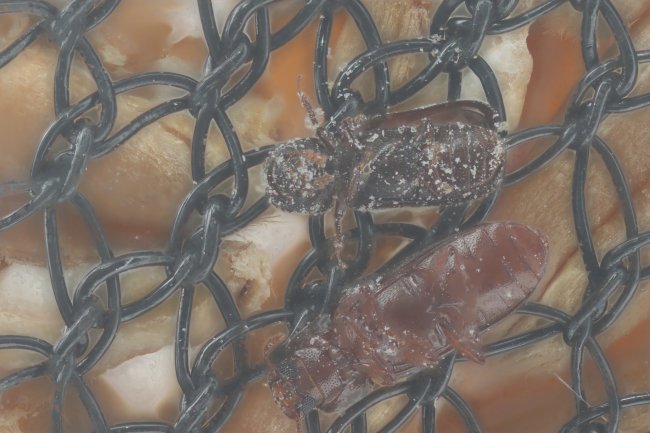
Assessing long-lasting insecticide netting as an alternative integrated pest management tactic for stored product insects
Bed nets have been used to help control vectors of arthropod-borne disease since the 1990s in tropical regions of the world. Bed nets are also known as long-lasting insecticide nets (LLINs), and consist of polyethylene mesh netting impregnated with insecticides. More recently, these nets have been considered for their use in control of agricultural pests before harvest. We are evaluating the ability of LLINs to intercept and prevent the dispersal of stored product insects in the post-harvest supply chain. Our work may contribute to the development and validation of an alternative tactic to intercept immigrating stored product insects in and around food facilities.
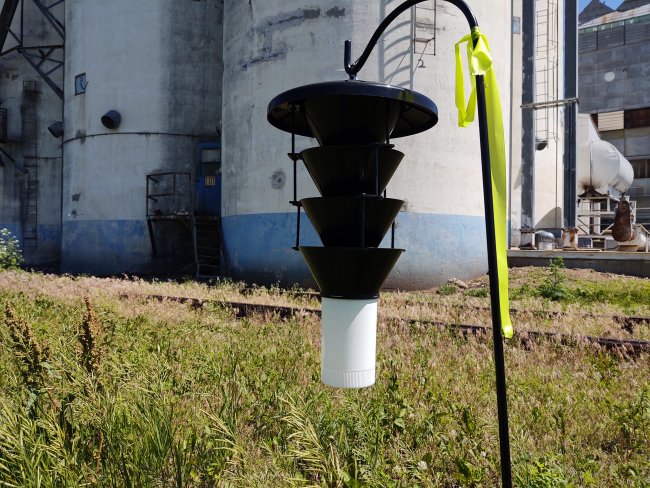
Development of attract-and-kill to manage stored product insects in and around facilities
One behaviorally-based management strategy we are working on developing is termed attract-and-kill. The concept behind this is simple: we deploy attractive pheromones or kairomones to attract foraging stored product insects to a spatially circumscribed area, where they come into contact with an insecticide and are removed from the foraging population. We can thus protect and reduce direct contact of insecticides on post-harvest commodities by managing insects in a different location. We are currently evaluating potential attractants and trap designs for a potential attract-and-kill device.
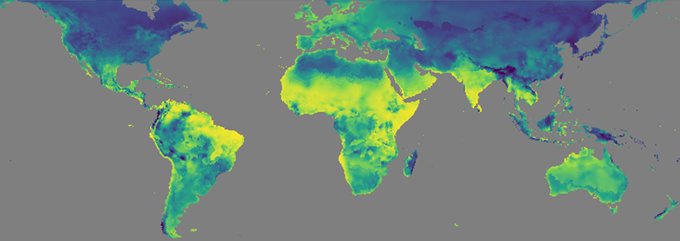
Improving surveillance tools and management tactics for invasive quarantine stored product insects
The invasive khapra beetle, Trogoderma granarium, has been rated as one of the top 100 worst invasive species. It was identified from 151 sites in 3 U.S. States in 1953, and the U.S. spent $11 million to eradicate it, which translates to $90 million in today’s currency. Though the effort was successful, there have been an increasing number of interceptions of the khapra beetle at U.S. ports and borders by APHIS, raising the concern that it may become established. If this happens, it would be devastating for the post-harvest supply chain since khapra beetle can feed on a large variety of animal and plant products. The work in my lab is looking at developing effective surveillance tools and validating them, which involves trips to APHIS-approved quarantine facilities, and international collaborations to trap the insect abroad. A related project is looking at whether the closely related species, Trogoderma variabile (warehouse beetle), can be used as a behavioral surrogate species for this pest to speed research and discover Grain aeration and modelling of aeration is one approach at reducing the need for chemical inputs after harvest.
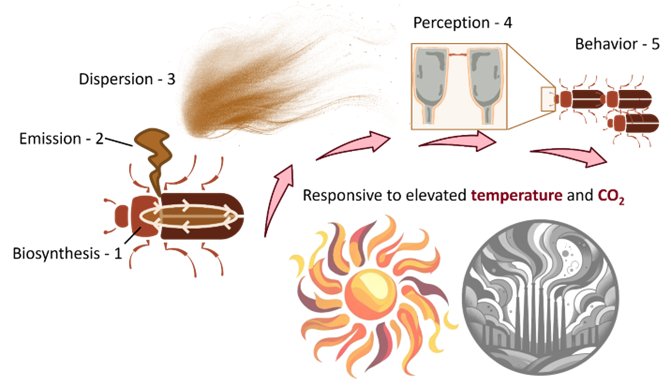
Understanding how the volatalome of stored product insects changes with temperature
The volatalome is all the semiochemical emissions by a given species. Using a newly published machine learning approach by our group, we are comprehensively describing the volatile profiles of different populations and species of stored product insect pests to identify chemical cues that can be used in insect pest management, while understanding how these may shift with temperature. This project leverages resources in our unit such as GC/MS, GC-EAD, eNose, and headspace collections to deliver improved outcomes in the era of volatalomics for American stakeholders.

